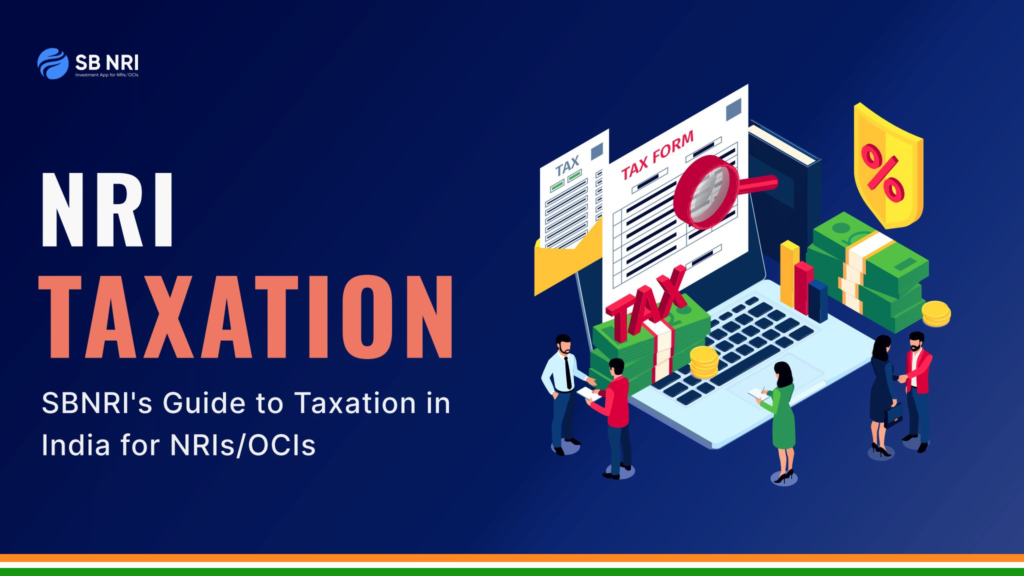![TDS on Sale of Property by NRI in India [New Rates for 2024]](https://sbnri.com/blog/wp-content/uploads/2024/02/Frame-1000004017-1024x553.png)
Properties sold in India by Non-Resident Indians (NRIs) and Overseas Citizens of India (OCIs) are liable for taxation under the Indian income tax laws. An NRI who wants to sell a property situated in India has to pay tax on capital gains. TDS is deducted whenever any property is purchased or sold. NRI tax on property sale or TDS on the sale of property by NRI depends on the sum of money received. In this article, we will discuss the applicability of TDS on the sale of property by NRI in India.
To speak to an NRI tax expert about TDS on property or get a lower TDS certificate, click on the button below.
Table of Contents
- Tax implications for NRIs selling property in India
- TDS on sale of property by NRI in India
- How to save tax on capital gains
- FAQs
Tax Implications for NRIs Selling Property in India
NRIs selling property in India are liable to pay taxes. The tax liability will depend on the period for which they have held the property before selling it.
If you sell a property that you have owned for more than 2 years, then you will be liable for long term capital gain tax on sale of property at 20%. In case a property is held for 2 years or less, the short-term capital gains tax will be applicable as per tax slab rates.
The date of the purchase of the property by the original owner will be considered for calculating capital gains on an inherited property.

TDS for NRI Property Sale in India
NRI TDS rate on sale of property owned by NRIs is 20% as long-term capital gain tax. For properties sold before 2 years, the TDS rate will be as per income tax slab rate of NRI seller.
- The buyer deducts 20% as TDS (Tax Deducted at Source ) as Long-term capital gains tax on the sale of property held for more than 2 years.
- Short-term capital gains tax on the sale of property held for less than 2 years: As per income tax slab of NRI seller.
| Capital Gains | Description | TDS Rate on Sale of Property by NRI |
|---|---|---|
| Long Term Capital Gains | Property held for more than 2 years | 20% |
| Short Term Capital Gains | Property held for less than 2 years | As per income tax slab rates of seller |
Surcharges and cess would also be charged on the capital gains. Here are the effective rates of TDS on the sale of property by NRI for long-term capital gains.
| Particulars | (A) Long-term capital gains tax | (B) Surcharge on LTCG tax | (C =A + B) Total tax (incl surcharge) | (D) Health & education cess | (C+D) Applicable TDS rate (incl surcharge + cess) |
|---|---|---|---|---|---|
| Sale price less than Rs. 50 lakh | 20% | Nil | 20% | 4% of total tax | 20.8% |
| Sale price Rs. 50 lakh to Rs. 1 cr | 20% | 10% of LTCG tax | 22% | 4% of total tax | 22.8% |
| Above Rs. 1 cr | 20% | 15% of LTCG tax | 23% | 4% of total tax | 23.92% |
The maximum surcharge rate on tax payable on dividend income and capital gain mentioned in Section 112 of Income Tax Act, has been capped at 15% as announced in Union Budget 2022.
Hence, regardless of whether the value of property sold by an NRI is Rs. 1 cr or Rs. 5 cr, or even Rs. 10 cr – the rate of TDS will remain the same i.e. 23.92%
In the case of short-term capital gains, surcharge and cess would be added to the applicable tax rate as per your income tax slab in the same manner as in the case of long-term capital gains.
The TDS shall be deducted when any payment is made to the NRI seller for the purchase of property, even if advance is being paid. The TDS shall be deposited by the buyer with the Income Tax Dept.
The TDS on purchase of property from NRI shall be deducted regardless of the transaction value of the property. Even if the price of the property is less than Rs. 50 lakh, the TDS shall be deducted.
Note: Surcharges and cess would also be charged on the capital gains.
Also Read: Income Tax e-filing: Top 10 NRI Income Tax Filing Benefits
How to Save Tax on NRI Property Sale?

NRIs can claim exemptions under Section 54 and Section 54EC on long-term capital gains from the sale of house property in India.
Exemption under Section 54
NRIs can claim exemptions on long-term capital gain on the sale of a house property under Section 54. The exemption is applicable on self-occupied and let-out house property.
To claim this exemption, you can invest the gains for the purchase of property either one year before the sale or 2 years after the sale of your property. You can also use the gains in the construction of a property that must be completed within 3 years from the date of sale.
Only one house property can be purchased or constructed from the capital gains to claim the exemption under Section 54 of Income Tax. The property must be situated in India. The exemption shall not be extended for properties bought or constructed outside India.
Note: If you sell the new property for which you claim exemption within 3 years of its purchase, the exemption can be taken back.
If you could not invest the capital gains until the date of filing of return (usually 31st July) of the financial year in which you sold your property, you can deposit the gains in a PSU bank or other banks. In your return claim this as an exemption from your capital gains, you won’t have to pay tax on it.
Exemption under Section 54F
You have to purchase one house property within one year before the date of transfer or 2 years after the date of transfer to claim exemption under Section 54F. You can also construct one house property within 3 years after the date of transfer of the capital asset.
Note the new house property must be situated in India and should not be sold within 3 years of its purchase or construction.
Capital Gains Bonds for Tax Exemption under Section 54 EC
You can save tax on your long-term capital gains by investing them in capital gains bonds issued by the National Highway Authority of India (NHAI) or Rural Electrification Corporation (REC). You can redeem them after 5 years and must sell them before the lapse of 5 years from the date of sale of the house property.
You are allowed a period of 6 months to invest in these bonds. However, to be able to claim an exemption, you will have to invest before the income tax return filing date.
Repatriation of Funds

As an NRI, if you wish to repatriate the proceeds from the sale of a property, to your country of residence, you are required to submit Form 15 CA and 15 CB. Form 15 CA ensures that taxes have been collected on the fund before it is repatriated abroad. You can fill out and submit the Form 15 CA yourself. Form 15 CB must be signed and submitted by a competent authority like a chartered accountant. You are allowed to repatriate up to USD 1 million during a financial year outside India.
Also Read: 5 Ways to save on the tax NRIs have to pay
How to file TDS on Sale of Property by NRI in India? Step-by-Step Process

Here is the process for filing TDS returns for NRIs:
- Calculating tax liability.
- Getting TAN of the buyer.
- Collecting documents for Lower Withholding Certificate.
- Registering on the I-T portal and applying.
Also read: How can NRIs file TDS Returns on Sale of Property in India?
TDS Payment, TDS Return and TAN No. for NRIs
- TDS deduction: The buyer must deduct TDS at the time of payment to the NRI seller. This includes instances when payments are made in installments; in such cases, TDS should be deducted proportionally at the time of each payment.
- TAN number: The buyer, whether an individual or a company, must obtain a Tax Deduction Account Number (TAN) before deducting TDS. Only the buyer is required to have a TAN No not the seller. This number is used by the tax department to track all transactions related to TDS.
- TDS Payment and TDS Return: The buyer must deposit the TDS with the government within a specified period, and also file a TDS return detailing the transaction. The TDS return form (Form 27Q) provides details of the TDS deducted and deposited.
- TDS Certificate: After depositing the TDS and filing the TDS return, the buyer should provide a TDS certificate (Form 16A) to the NRI seller as proof of the deduction and deposit. The NRI seller can use this certificate to claim credit for the TDS while filing their Indian income tax return.
- Lower TDS Deduction: If the NRI seller believes that their tax liability on the capital gains from the property sale will be lower than the TDS, they can apply to the Income Tax Department for a certificate for lower deduction of TDS (under Section 197). If approved, the buyer will deduct TDS at this lower rate.
Important Points about TDS for NRI Property Sale in India
Listed below are the important points regarding the deduction of TDS on sale of property by NRI:
- Both NRIs as well as OCI card holders are eligible for a lower TDS certificate.
- Make sure to get the Certificate from the Income Tax Department for computation of capital gains to reduce the TDS to be deducted.
- The income tax officer will review several documents including purchase price, date of purchase, expenses on renovation/ construction, if any, etc. along with Form 13. If he finds them satisfactory, he will issue a lower TDS certificate.
- If the NRI seller is unable to procure the certificate, the TDS would be deducted from the sale value, resulting in excess TDS deduction.
- In addition to the property registration documents, the NRI seller will also need to collect Form 16A from the buyer.
- The NRI seller can reinvest the capital gains in India to reduce the TDS and tax liability.
- The seller has the option to claim the refund of the excess TDS deducted at the end of the year.
- If there are two sellers (co-owners), both of them will have to file Form 13 separately for reducing the TDS rates.
Important Points for an NRI Seller
Listed below are the points that NRI sellers must keep in mind regarding the deduction of TDS on the sale of a property by an NRI:
- The seller should try and obtain a certificate from the income tax department to calculate the capital gains, which would result in a reduced TDS deduction.
- Various documents, including the Purchase Price, Date of Purchase, expenses on Renovation/Construction, and others, need to be submitted along with Form 13. These documents will be reviewed by the income tax officer, and if accepted, a certificate for a lower TDS deduction will be provided.
- If the seller is unable to obtain the certificate, TDS will be deducted based on the sale value, resulting in a higher deduction.
- The seller must collect Form 16A from the buyer, along with the Property Registration Documents.
- The seller can reduce their capital gains, thereby reducing the TDS and tax liability, if they intend to reinvest the capital gains in India.
- If the seller chooses not to obtain the certificate, they can apply for a refund of the excess TDS deducted at the end of the year.
- If two sellers are co-owners of the property, both of them need to submit Form 13 separately to reduce the TDS cost.
- The compliance of the lower TDS certificate (Form 16) applies to both NRI and OCI cardholders, and OCI cardholders can also avail the benefits.
Important Points for the Buyer
When purchasing a property from an NRI, the buyer is responsible for the following:
- The buyer should deduct the TDS at the time of each payment, not during the property registration process.
- The deducted TDS amount must be deposited with the income tax department as per the specified schedule for TDS deposits.
- The buyer should file the TDS return with the income tax department as per the specified schedule for TDS return filing.
- After filing the TDS return, the buyer should provide Form 16A to the seller. Form 16A is a TDS certificate confirming that the buyer has deposited the TDS amount with the seller.
- If there is a delay in TDS payment, interest will be levied at a rate of 1% or 1.5% per month, depending on the circumstances.
- Late filing of TDS return will result in a penalty of Rs 200, and the income tax officer may impose a penalty of up to Rs 1 lakh.
- In the case of a home loan, TDS should be deducted when making payments to the seller, except for EMIs paid to the bank.
- TDS is deducted in accordance with the aforementioned schedule for advance payments. This schedule applies to all payments made prior to obtaining the lower TDS certificate.
Properties are one of the best NRI investment options in India. However, buying and selling a property is taxed.
Calculate your TDS Refund with SBNRI’s TDS Refund Calculator
A TDS refund is the process of reclaiming the excess tax deducted at source by the payer if the actual tax liability of the taxpayer is lower than the TDS deducted. This situation typically arises when the income tax calculated on the total income is less than the TDS already deducted. To claim a TDS refund, taxpayers need to file an income tax return (ITR). The Income Tax Department processes the ITR and verifies the details. If the tax department finds that the TDS paid is more than the actual tax liability, the excess amount is refunded to the taxpayer.
You can easily find out how much tax refund you can get by calculating your TDS Refund from this TDS Refund Calculator.
Access SBNRI’s Exclusive NRI Taxation Guide

NRIs and OCIs can now access SBNRI’s exclusive NRI Taxation Guide covering in-depth information about DTAA, Gift Tax, Rental Income Tax, ITR Filing, Types of ITR Forms for NRIs, Capital Gain Tax, Income Tax, and more. The report will help you understand India taxation on mutual funds, other asset classes and how you can comply with the regulations.
Access NRI Taxation report here
Contact SBNRI
Due to a complicated tax system and recurrent amendments, understanding tax laws can be confusing and NRIs may be subject to additional fees or miss claiming deductions and other benefits. At SBNRI, we understand this struggle. You can download SBNRI App to connect with our NRI Tax Experts to know more about new TDS/ TCS rules for NRIs. You will also get end-to-end assistance related to NRI tax filing.
SBNRI will also help you get a lower TDS Certificate. You can also click on the button below to ask any questions. Visit our blog and YouTube Channel for more details.
FAQs
Can NRI transfer property in India?
Yes, NRIs can transfer one’s immovable property in India to a resident Indian. The NRI can transfer any immovable property (other than agricultural land or farmhouse) to a citizen of India residing abroad or a PIO cardholder resident outside India.
What is the TDS on NRI property?
TDS (Tax Deducted at Source) shall be deducted whenever any property is sold/ purchased. The buyer needs to deduct TDS and pay the balance to the seller. The amount to be deducted depends on the residential status of the seller. In the case of an NRI seller, the amount of TDS to be deducted will depend on the quantum of money received by the seller.
How can NRIs avoid paying TDS on property sale?
If an NRI is selling property in India, the buyer is required to deduct TDS at the rate of 20% in case of long-term capital gains. However, if the property is sold before two years, TDS shall be deducted at the rate of 30% as a short-term capital gains tax.
What is the TDS rate on sale of property by NRI?
Long-term capital gains on the sale of property held for more than 2 years: 20%. Short-term capital gains on the sale of property held for less than 2 years: As per the income tax slab rates of the seller
Do NRIs pay capital gains tax?
Yes, capital gains tax provisions for an NRI are similar to those for a resident individual except for the applicability of TDS provisions. Like resident investors, capital gains tax for an NRI depends on the holding period and the type of property sold.
Can an NRI sell property in India without visiting India?
Yes, NRIs can appoint someone in India through a power of attorney (POA). The POA needs to be legalized and apostilled in the NRI’s home country. Afterward, it must be registered in the Indian state where the property is located.
Is TDS compulsory for NRI?
TDS is paid by any non-residents for any amount generated from business transactions in India. The amount may or may not be an income of a profit. NRIs have to pay TDS even for income types from which resident Indians are liable, like dividends on mutual funds.
How can I avoid capital gains tax on property sale?
Several exemptions under the Income Tax Act can help property sellers save a significant amount. You can reinvest the profit generated from sale of property for the purchase of another property to benefit from these exemptions. Additionally, investing in particular bonds, such as capital gains bonds, can help you obtain exemptions on long-term capital gains tax under Section 54EC.
How to file TDS on sale of property from NRI?
The buyer is required to file Form 27Q within 30 days from the end of the quarter in which the TDS was deducted, mentioning the details of:
- The deductee (NRI).
- The TAN (Tax Deduction and Collection Account Number) of the deductor (buyer).
- The amount of TDS deducted.
What are the rules for an NRI to sell property in India?
Here are the rules for an NRI to sell property in India:
- Property documents should be in the Seller’s name and a power of attorney.
- A no objection certificate (NOC) confirms that the property doesn’t have any pending payments or obligations.
- Your own evidence of identification, residence proof, and PAN card.



